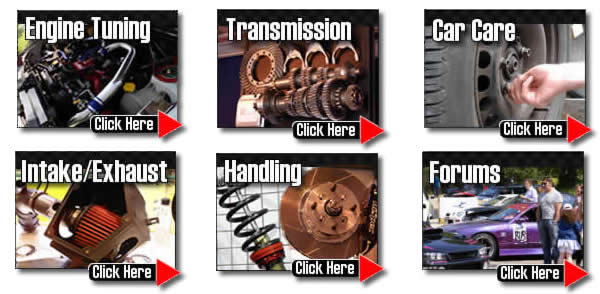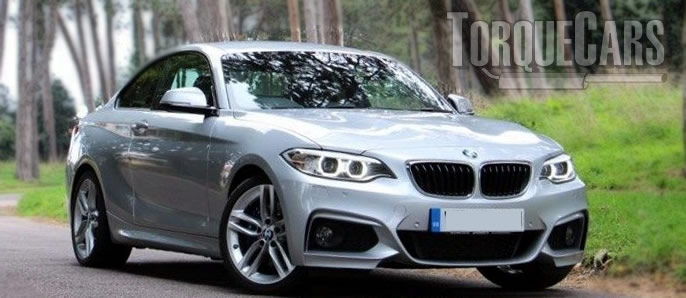Tuning the BMW 2 Series F22
"Thanks for reading our BMW 2 Series tuning article."
We outline options for your 2 Series tuning and point out the optimum upgrades. BMW 2 Seriess really good project cars and with carefully picked enhancements you can noticeably maximize your driving fun.
The 2 Series is a awesome tuning project to play with. With the right mods your 2 Series can be transformed into a stunning project. Don't waste money, do your homework and follow our unbiased guides to each performance upgrade to avoid wasting money.

Handling/Suspension upgrades
Improving the handling for DIY mechanics first priority in your 2 Series tuning project.
Setting a small amount of negative camber on the fronts and a few degrees of toe in to improve stability or toe out for better cornering, will substantially improve your 2 Series in handling and cornering.
We suggest that you fit sports suspension and lower the car by 30mm - 37 mm. Larger drops require arch work - especially on models already equipped with uprated suspension.
Top end power should be your overall aim with a nice fat wide peak torque band.
Sadly with smaller engine sizes you are wasting your time spending money on modifications, so if this applies to you get yourself an engine swap then apply the following mods.
Power mods.
Petrol engines
- 218i 2015– B38A15M0
1.5 L I3 turbo 100 kW (134 hp) 4,500–6,000 rpm (162 lbft) 1,250 rpm - 220i 2014–2016 N20B20
2.0 L i4 turbo 135 kW (181 hp) 5,000–6,250 rpm (199 lbft) 1,250–4,500 rpm - 2016– B48B20
2.0 L i4 turbo (214 lbft) 1,250–4,500 rpm - 228i 2014–2016 N20B20
2.0 L i4 turbo 180 kW (241 hp) 5,000–6,500 rpm (258 lbft) 1,250–4,800 rpm - 230i 2016–2019 B48B20
2.0 L i4 turbo 185 kW (248 hp) 5,200 rpm (258 lbft) 1,450–4,800 rpm - M235i 2014–2016 N55B30O0
3.0 L I6 turbo 240 kW (322 hp) 5,800–6,000 rpm (332 lbft) 1,300–4,500 rpm - M240i 2016– B58B30O0
3.0 L I6 turbo 250 kW (335 hp) 5,500 rpm (369 lbft) 1,520–4,500 rpm - M2 2015–2017 N55B30T0
3.0 L I6 turbo 272 kW (365 hp) 6,500 rpm (343 lbft) 1,450–4,750 rpm - M2 Competition 2018– S55
3.0 L I6 twin turbo 302 kW (405 hp) 5,370–7,200 rpm (406 lbft) 2,350–5,230 rpm
Diesel engines
- 218d 2014–2015 N47D20O1
2.0 L i4 turbo 105 kW (141 hp) 4,000 rpm (236 lbft) 1,750–2,500 rpm - 2015– B47D20
2.0 L i4 turbo 110 kW (148 hp) 4,000 rpm (236 lbft) 1,500–3,000 rpm - 220d 2014–2015 N47D20O1
2.0 L i4 turbo 135 kW (181 hp) 4,000 rpm (280 lbft) 1,750–2,750 rpm - 2015– B47D20
2.0 L i4 turbo 140 kW (188 hp) 4,000 rpm (295 lbft) 1,750–2,500 rpm
225d 2014–2015 N47D20T1
2.0 L i4 twin turbo 160 kW (215 hp) 4,400 rpm (332 lbft) 1,500–2,500 rpm - 2015– B47D20
2.0 L i4 twin turbo 165 kW (221 hp) 4,400 rpm (332 lbft) 1,500–3,000 rpm
These are the tuning kits are usually installed by our members, decide how far you want to go before you get going.
Getting the correct grade of tuning upgrades for your planned usage of the car is vital. Stage 3 motor sport mods just don't work well on the road hard to control in slow traffic.
Please watch our introduction Video tutorial to car tuning. Be sure to subscribe and support our new channel.
How to tune your car
- Improve the handling
Focus on Suspension improvements, such as coilovers and make sure the bushings are in good order and that the alignment is correct. Then focus on improving the brakes, with a big disk brake conversion kit and fast road brake pads.
- Remove restrictions
Focus on the intake and exhaust with filters being the common point of restriction in a tuned car. Intercoolers may also become restrictive on turbo engines so this may also need to be uprated.
- Burn more fuel & air
Increase the fuelling so it matches the air coming into the engine. The ratio is important so you need to improve the fuel pump and injectors, so the head mods, big valve conversions, fast road camshafts and forced induction upgrades extra supply of air is adequately met.
- Test and replace any weak parts
Weak areas are commonly the clutch, the turbocharger and pistons and crankshaft in a highly tuned engine. Makes sure these components will cope with your power aspirations.
- The Tune or Remap
A cars ECU controls the fuel, timing, spark and even the turbo in some cases, so to fully extract your gains you should remap the car last and this will fully release the power. Some cars are easy to map, and others require piggyback ECU's or aftermarket ECU's but this is the most vital step of your tuning project.
Modifying to Stage 1:
Panel air filter, Alloy wheels, Remap, Lighter flywheel, Suspension upgrade (drop 30mm - 37 mm.), Sports exhaust.
Modifying to Stage 2:
Fast road cam, Ported and polished head, Power/Sport clutch, fuel pump upgrades, high flow fuel injector.
Modifying to Stage 3:
Competition cam, Engine balancing, Adding or upgrading forced induction (turbo/supercharger), Sports gearbox, Internal engine upgrades (pistons/head/valves).
You really need to keep as much low end torque as you can and aim to get a wide power band across the rev range rather than a narrow top end power spike.
The aim of our advice is to give a brief overview of modifying modifications and point you in the right direction, our forum is where you can ask for more detailed advice and tips on your modified car project, the best tuning upgrades and all aspects of modding cars.Fast road cams offer one of the biggest power gains for your money as far as a solitary modified upgrades goes on a NASP engine.

It improves the intake and exhaust flow and increases the power if done right. Ideally you'd add other mods and finish up with a reflashed ECU. We'd also caution you not to go with a motor sports profile cam as this upsets the engines idling and general town driving characteristics.
Don't forget to pay attention to the fuelling when you are increasing the power - it makes the car more thirsty.
Using high octane petrol is another option if you find you are suffering from pinking or premature ignition on your BMW project after fitting other performance kits. To get sufficient fuel you may need to increase the injectors on your engine.
If you are increasing your fuelling with bigger injectors you will also need to get a bigger fuel pump to supply it.
Intake and Exhaust Tuning.
Now we move on to the intake and exhaust and ensure proper flow through the engine. Please note that WE DO NOT FIND IMPROVEMENTS WITH INDUCTION KITS, unless you have tuned your car extensively and are finding that the standard air intake has become limited.
Induction kits can work well on turbo engines and larger engines (if supplied with a suitable cold air feed or air box), generally though we'd just recommend for 2 Series engines you should settle for a high performance panel air filter preferably made from cotton.
Sports exhausts generally help improve air flow from the engine but do not go too big or you may end up will reduce the flow rate. Stick to 1.5 to 2.5 inches for best results.
Getting a professionally flowed (ported and polished) head with larger valves can fully release the engines power.
When you heavily modify your 2 Series you will discover that the standard clutch starts to suffer so get an uprated clutch. The best mods we recommend for your 2 Series are Remapping or piggy back ecu, fast road cam and air intake and exhaust.
Turbo engines are just pleading to be Upgraded. You will see impressive power gains on most modern turbo engined cars including diesels making a remap one of the most cost effective and impressive modifications for your money.
Despite the large cost involved adding forced induction to a NASP engine will give large power gains. Superchargers are often easier to add than a turbo. It is difficult to map fuelling with a turbo as the boost comes on exponentially with rpm.
The nice correlating boost and rpm characteristics of the supercharger make them simpler to map. To cope with forced induction you will usually need to decrease the engines compression ratio .
Alloy wheel upgrades.
The benefits of alloys include a lower unsprung weight and more efficient brake cooling. If you are serious about performance then you will need to carefully choose your tires - ideally with a soft compound tire. The downside to large rims on your 2 Series is that you're altering your final drive ratio so this will have a negative effect on acceleration and performance.
Due to this fact aim to keep the overall rolling diameter of the wheel your OEM settings. In all cases we do not recommend going bigger than 18 inches. (And ditch the Runflats!)
For more information on Tuning your car please join us in our friendly forum where you can discuss 2 Series options in more detail with our 2 Series owners. It would also be worth reading our unbiased BMW tuning articles to get a full grasp of the benefits and drawbacks of each modification.
Please help us improve these tips by sending us your feedback in the comments box below.
We love to hear what our visitors have got up to and which mods work best for them on each model of car. Comments are used to improve the accuracy of these articles which are continually updated.
If you liked this page please share it with your friends, drop a link to it in your favourite forum or use the bookmarking options to save it to your social media profile.
Check out TorqueCars new YouTube channel, and see their awesome new content...
Feedback
Please use our forums if you wish to ask a tuning question, and please note we do not sell parts or services, we are just an online magazine.
Help us improve, leave a suggestion or tip
